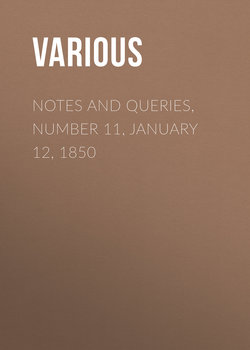Читать книгу Notes and Queries, Number 11, January 12, 1850 - Various - Страница 7
NOTES FROM FLY-LEAVES, NO. 4
ОглавлениеIn order to forward your views as regards the valuable department of "Notes from Fly-Leaves" I have spent some leisure hours in beating the covers of a portion of my library. I send you the produce of my first day's sport, which, you will observe, has been in the fields of poetry. Make what use of it you think fit, selecting such notes only as you think of sufficient interest for publication.
I. Note in the handwriting of Richard Farmer, in a copy of "Canidia, or the Witches; a Rhapsody in five parts, by R.D." 4to. London, printed by S. Roycroft for Robert Clavell, 1683.
"In Mr. Hutton's Catale P. 65. N. 1552. this strange composition is ascribed to one Dixon. There was a Robert Dixon, an author about the time, and D.D. (Woods's Fasti, v. ii. p. 103.), but it surely must not be given to him! Qu.? This is the only copy I have seen, 1785."
[Lowndes has the work under the name of Robert Dixon, D.D.]
II. Note in the handwriting of James Bindley, in a copy of an English translation of Milton's "Defensio pro Populo Anglicano," printed in the year 1692.
"Translated into English by Richard Washington, Esq., of the Middle Temple."
On another page, however, he has written,
"Mem. in a miscellany called 'Poems on Affairs of State,' 8vo. 5th edit. 1703, at page 223 'In memory of Joseph Washington, Esq., late of the Middle Temple, an elegy written by N. Tate, Servant to their Majesties.' Though Mr. Warton calls him Richard, his name was, I believe, as above, and the translator most likely of this book.—J.B."
To this is added, in the handwriting of the late Mr. Ford, bookseller, formerly of Manchester—
"The note on the opposite side, signed J.B., stands for James Bindley, who may be considered as good authority for what is here asserted. Some curious information will be found relative to the original work in 'Diction. des Livres Condamnés,' &c., par Peignot. tom. ii. p 319."
III. Note in the handwriting of Mr. Ford, in a copy of Fletcher's "Purple Island,", &c. 1633.
"See the lines at the end by Francis Quarles, which are ingenious and poetical. This curious and very rare volume I purchased out of Longman's celebrated catalogue of old English poetry, called 'Bib. Ang. Poet.,' where it will be found marked £2 12s. 6d., which is what it cost me. Mr. Montgomery, the poet, styles
this poem a fantastical allegory describing the body and soul of man, but containing many rich and picturesque passages (v. his 'Christian Poem,' p. 163.) But there is a most excellent critique upon it in the 'Retrosp. Rev.' for Nov. 1820 (v.p. 351.), but see also Headley, who highly praises it. The name of Fletcher ranks high in the list of our poets. He was born in 1584, and was the son of Dr. Giles Fletcher, who was himself a poet; the brother of Giles Fletcher, the author of 'Christ's Victory;' and the cousin of John Fletcher, the celebrated dramatist."
IV. In a note on a copy of "Iter Boreale, with large additions of several other poems, being an exact collection of all hitherto extant; never before published together. The author R. Wild, D.D., printed for the booksellers in London, 1668,"—the author is described as "of Tatenill, near Burton supr Trent." The note is apparently of contemporary date, or a little later.
This edition is not noticed by Lowndes, nor is another edition (anonymous), of which I have a copy, the date of which is 1605 (printed for R.J., and are to be sold in St. Paul's Churchyard). Of course this date is a mistake, but query what is the real date? Probably 1665. The volume concludes with the 70th page, being identical with the 72nd page of the edition of 1668.
V. Note in the handwriting of Mr. Ford, in a copy of "Waller's Poems," 1645 (after quoting "Rymer on Tragedy," pp. 2. and 79.):—
"The dedicatory epistle in this first and rare edition 'To my Lady,' is omitted in all the subsequent editions, even in Fenton's of 1729 (see Dibdin).—I find it is inserted in Fenton's edition among the speeches and letters; but he adds, in his observations thereon, that it appears not to have been designed for a public dedication, though why or wherefore he assigns no reason; and he further adds, 'I never met with any tradition to what Lady it was originally directed.' It certainly has as much the appearance of having been intended for a dedication, if we may judge from internal evidence, as such sort of things generally have. This is the first genuine edition and very scarce. It is priced in the 'Bib. Ang. Poet.'; at 2 gs. No. 851. The subsequent editions are of no particular value, exception Fenton's elegant and complete edition in 4to., which is worth about the same sum."
VI. Note in a handwriting of the 17th century, in a copy of Cawood's edition of the "Ship of Fools," opposite to the dedication, which is "Venerandissimo in Christo Patri ac Domino, domino Thomæ Cornissh, Tenenensis pontifici, ac diocesis Badonensis Suffraganio vigilantissimo," &c.
